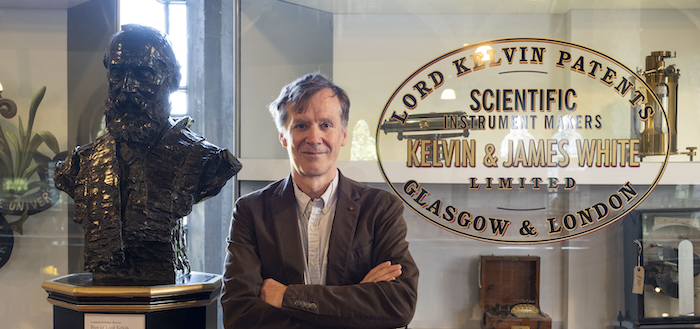University of Glasgow to Commemorate the Life and Contributions of Lord Kelvin
The University of Glasgow is gearing up to celebrate the 200th anniversary of the birth of one of its most distinguished researchers.
William Thomson, better known as Lord Kelvin, was born on 26th June 1824. During his 53-year career at the University, he became one of the 19th century’s most important scientists, making a series of significant breakthroughs in mathematics, physics and engineering which helped shape the modern world.
His groundbreaking work on thermodynamics led to the development of the absolute temperature scale, which is now known as the Kelvin scale. He played a key role in laying the first transatlantic telegraph cable, inaugurating the age of intercontinental communications, and made important contributions to the study of electricity and magnetism. He filed 70 patents during his lifetime for inventions including the Kelvin compass, which helped improve maritime navigation.
With four weeks to go until the bicentenary of his birth, the University is unveiling a series of public events and activities linked to Kelvin’s life and work which will run during the month of June.
The University’s Mazumdar-Shaw Advanced Research Centre (ARC) will host the Lord Kelvin: Beyond Absolute Zero exhibition as part of the Glasgow Science Festival.
From June 8th, visitors will be able to learn more about Kelvin’s work through displays of rarely-seen artifacts from the University’s Special Collections, and learn more about some of his lesser-known achievements, including his solution for the most efficient space-filling shape. Two new Kelvin-inspired works by artist Gregor Harvie, created in collaboration with University researchers, will be on public display for the first time at the event. After the festival concludes on June 16th, the exhibition will return to the ARC for a two-week encore from Tuesday 25th June.
Kelvin’s achievements in precision measurement will be celebrated in the context of the cutting-edge science of today with two public lectures from speakers from the worlds of physics and engineering.
On June 25th, Nobel laureate Professor Takaaki Kajita will give a talk on measuring neutrinos and gravitational waves, achievements in high-precision measurements which follow in the footsteps of Lord Kelvin’s own measurement breakthroughs. The lecture is supported by the Institute of Physics and the Institute of Physics Scotland.
On June 26th, Dr Daniel Mitchell of the IEEE History Centre will further explore Kelvin’s work in measurements and quantification and how it formed a principal theme uniting many of his achievements in science and engineering. The event will be followed by a reception at the Hunterian Museum, supported by Drygate Brewing Company.
The Hunterian, which has a permanent display dedicated to Kelvin, will be showcasing his life and work through public events and lectures in June. The Hunterian and the University of Glasgow Library are holding a two-part event which offers a closer look at selected items from both Archives and Special Collections and The Hunterian’s scientific instrument collection.
On June 21st, the Hunterian’s curator of scientific and medical history collections, Nicky Reeves, will be hosting an online lunchtime talk about the hundreds of scientific instruments owned, designed or used by Kelvin which are kept in The Hunterian’s collection.
Professor Miles Padgett is Kelvin Chair of Natural Philosophy in the School of Physics & Astronomy. He said: “I’m proud to hold the position that celebrates Kelvin, one of the University’s most remarkable inventors and innovators, and whose example continues to inspire scientists and engineers around the world today.
“I think Kelvin himself would be proud of our research at the University of Glasgow today. All across the University, just like Kelvin, we’re working to turn pure science into innovative technologies that impact on the real world, making better medical devices, next-generation communications, new net-zero technologies and more.
“I hope that people will join us on campus throughout June and beyond to celebrate Kelvin by seeing our rich collection of artifacts and artwork inspired by his historic legacy, and hearing about his life and work from expert speakers.”

